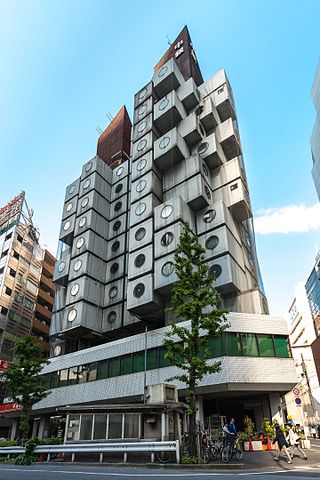The late Kurokawa Kisho, was the original capsule architect.
.
Is the prefab pod the way forward for housing?
An iconic building has just been pulled down in Tokyo:
Nakagin Capsule Tower to be Demolished Mid-April | ArchDaily
It was the world’s first example of capsule architecture ostensibly built for permanent and practical use.
Nakagin Capsule Tower – Wikipedia
With a piece just out from today’s ArchDaily, which looks at a beautiful film on the architect and his capsule architecture:
“In the background there is still invisible Japanese tradition’’, expresses Kisho Kurokawa, in an excerpt from the film ‘Koshuu’. He puts an emphasis on Japanese tradition, an architectural tradition that rejects symmetry despite the utilization of high-tech. He contemplates the Nakagin capsule tower (1972) a mixed-use residential and office tower located in Tokyo, Japan. The first of capsule architecture built for practical and permanent use.
Jesper Wachtmeister’s ‘Kochuu’ is based upon the influence and origins of Modernist Japanese architecture. Through visions of the future, tradition and nature, it amplifies elements of Japanese tradition and its impact on Nordic design. The narrative tells us of how contemporary Japanese architects strive to unite the ways of modern man with old philosophies to create anew.
Kisho Kurokawa’s Nakagin Capsule Tower in Visually Captivating Film ‘Koshuu’ | ArchDaily
Watch KOCHUU – Japanese architecture / influence and origin Online | Vimeo On Demand on Vimeo
In the middle of the pandemic, the following observation was made – which shows that this is perhaps relevant to these parts:

The late Kurokawa Kisho, was the original capsule architect. His pods are attached to a frame superstructure and were meant to be dismountable for weekend vacations in the countryside.
Nowadays so much of construction is made up of prefabricated units eg toilet suites, kitchens, studios pads etc and more pods are likely. It suggests such containers will become the habitat furniture of the future, and I suppose this is already happening in new-builds even in the Sid Valley.
Perhaps in post Covid UK we will live in the city centre and commute to jobs in the suburbs, so its possible I suppose Exeter folk will work Sidmouth? Thankfully East Devon is not yet Greater Tokyo, but there are many environmental advantages to prefabs.
Work pods and working from home – Vision Group for Sidmouth
There are indeed many environmental advantages to prefabs:
Especially in these difficult times:
How to solve the rural housing crisis | Bricks & Mortar | The Times (paywall)
Meanwhile, councils in these parts are thinking the same:
Modular housing to help young homeless people into independent living – Vision Group for Sidmouth
High-quality zero carbon affordable homes – Vision Group for Sidmouth
Should we build affordable housing above car parks? – Vision Group for Sidmouth